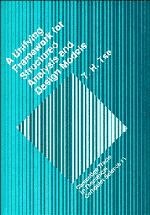 A Unifying Framework for Structured Analysis and Design Models
A Unifying Framework for Structured Analysis and Design Models Book contents
- Frontmatter
- Contents
- Preface
- List of Tables and Figures
- Chapter 1 Introduction
- Chapter 2 Desirable Features of Systems Development Environments
- Chapter 3 A Comparison with Related Work
- Chapter 4 An Initial Algebra Framework for Unifying the Structured Models
- Chapter 5 A Functorial Framework for Unifying the Structured Models
- Chapter 6 The Identification of Unstructuredness
- Chapter 7 A Prototype System to Implement the Unifying Framework
- Chapter 8 Conclusion
- Bibliography
- Index
Preface
Published online by Cambridge University Press: 28 January 2010
- Frontmatter
- Contents
- Preface
- List of Tables and Figures
- Chapter 1 Introduction
- Chapter 2 Desirable Features of Systems Development Environments
- Chapter 3 A Comparison with Related Work
- Chapter 4 An Initial Algebra Framework for Unifying the Structured Models
- Chapter 5 A Functorial Framework for Unifying the Structured Models
- Chapter 6 The Identification of Unstructuredness
- Chapter 7 A Prototype System to Implement the Unifying Framework
- Chapter 8 Conclusion
- Bibliography
- Index
Summary
Structured analysis and design methodologies have been recognized as a popular and powerful tool in information systems development. A complex system can be specified in a top-down and graphical fashion, enabling practitioners to visualize the target systems and communicate with users much more easily than by means of conventional methods. As a matter of fact, the structured methodologies have been designed by quite a number of distinct authors, each employing a number of models which vary in their graphical outlook. Different models are found to be suitable for different stages of a typical systems life cycle. A specification must be converted from one form to another during the development process. Unfortunately, however, the models are only derived from the experience of the authors. Little attempt has been made in proposing a formal framework behind them or establishing a theoretical link between one model and another.
A unifying framework is proposed in this book. We define an initial algebra of structured systems, which can be mapped by unique homomorphisms to a DeMarco algebra of data flow diagrams, a Yourdon algebra of structure charts and a Jackson algebra of structure texts. We also find that the proposed initial algebra as well as the structured models fit nicely into a functorial framework. DeMarco data flow diagrams can be mapped by a free functor to terms in the initial algebra, which can then be mapped to other notations such as Yourdon structure charts by means of forgetful functors.
- Type
- Chapter
- Information
- A Unifying Framework for Structured Analysis and Design ModelsAn Approach Using Initial Algebra Semantics and Category Theory, pp. vii - viiiPublisher: Cambridge University PressPrint publication year: 1991
